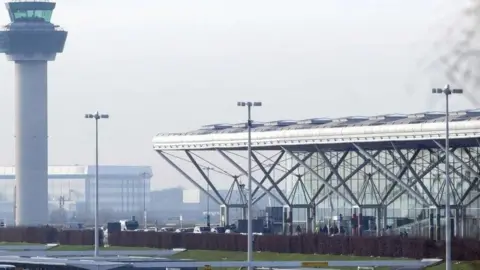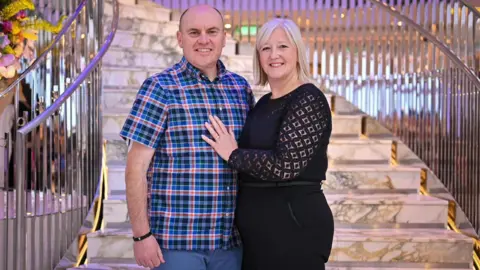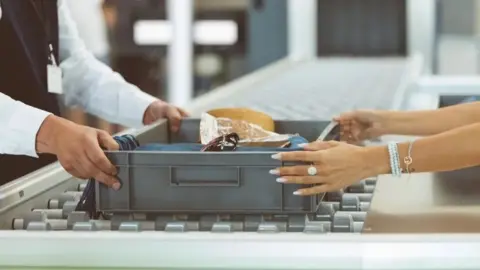Diabetic children treated 'as criminals' at airport
 PA Media
PA MediaChildren and adults with type 1 diabetes faced "appalling" treatment at London Stansted Airport and were made to feel like criminals, according to a number of complaints made to the BBC.
One mum from Lowestoft, in Suffolk, claimed her teenage son was "adamant he won’t fly again" after feeling "bullied" into going through an X-ray scanner that could damage his medical devices.
Others described being taken to a room to be searched while their essential equipment was kept at the security desk.
The airport said all its security staff "receive thorough training" to provide "understanding and awareness" of medical conditions, and apologised to one family for any "confusion or distress" caused.
Why are Type 1 diabetics affected by airport scanners?
- People with type 1 diabetes inject the hormone insulin – which you need to survive - because their bodies no longer produce it.
- Many type 1 diabetics wear a pump that delivers insulin and a separate sensor that tracks blood sugar levels.
- Both can be damaged by airport scanners, so the Civil Aviation Authority said these devices "must not be either screened by x-ray or pass through the security scanner, so will be screened by alternative methods".
 JDRF
JDRF'He doesn't want to fly again'
April from Lowestoft said the trip from Stansted in July was her family’s first flight since her autistic son, aged 15, was diagnosed with type 1 diabetes.
She booked special assistance and brought a letter from their medical team.
"I told them he can’t go through the x-ray machines, but the security guards insisted ‘he’s going through'," she recalled.
"It felt like we had no option, like we were bullied into it."
Her son was eventually taken to a private room to be searched, she claimed, and said a manager apologised to them.
"We didn’t know where his medical supply bag was, which was really worrying. It was not a nice experience for him: he is adamant he doesn’t want to fly again."
April said when they arrived in Turkey, some devices stopped working and they had to rely on spares.
She said the return journey through Turkey was "brilliant" but the Stansted experience was "appalling".
London Stansted Airport said no formal complaint had been made and offered to meet with April's family.
"Passengers always have a right to opt out of a body scanner for medical or non-medical reasons, and have a hand search in private instead," a spokesperson said.
"If there was any miscommunication at the time, we are very sorry for that and any distress or confusion this may have caused, and wholeheartedly apologise."
 Supplied
SuppliedCaroline and Wayne, of Orpington, fly frequently with their children Ellis, 14, and Esme, 11, who both have type 1 diabetes.
"We've been to Stansted a good few times and never had a problem before, it's been really friendly," Caroline said.
"What we experienced last month was totally different - not nice at all."
"We were told to go into a room for a full body search, and there were about five or six staff in the room: doing and watching the search, or filling in papers.
"Normally they just do a body search at the security area, pat down the clothes, take the shoes off, maybe a swab. I started to worry there was something more going on – I felt like a criminal."
Wayne, who was left waiting with the luggage and wondering what was happening, described it as "frustrating".
"You feel like you’re being victimised for having children with type 1 diabetes. That didn’t start that holiday off very well for us.
"It should be one rule for every airport, it can’t be different," he added.
 Supplied
Supplied'Lack of communication'
Natalie from Harlow said her son, 19, was "made to take his shoes off and marched into a room" without any explanation on 15 July.
She told BBC News: "I said to the staff, ‘I feel like we’re criminals here, is this going to happen every time, this is crazy?"
"They said 'This is what we’ve got to do'."
She said he was patted down and questioned about his blood sugar sensor.
"Then they stuck a piece of paper in front of him and said 'sign this', but didn’t explain what he was being asked to sign," she said.
She claimed her son had the same experience at Stansted when he was 17 and newly diagnosed.
Natalie understands it is "difficult" for airport security to navigate "so many different devices".
"But why could the guy not look me in eye? It was the lack of communication and human kindness, it was the way they bark at people - it's quite intimidating."
London Stansted said it asked passengers to "undertake a private search to check areas thoroughly", which "may include the need to move clothing and swab a device".
"We would not want to do that in public," it added.
"A private search involves an officer undertaking the search with a manager witnessing, with females searching females and males for males."
 Ceri Jones
Ceri JonesCeri Jones, from the Rhondda Valley in Wales, was diagnosed with type 1 diabetes at the age of 52 after going into intensive care, and flew to Europe a few weeks later.
He said: "I was initially held up by the conveyor belt, viewed with suspicion by the security team. Eventually I was escorted to a back room and asked some over-zealous questions about my travel plans.
"All of my belongings were held somewhere out of sight, including my spare tech and insulin.
"When I finally arrived back to the security conveyors, a guy wearing rubber gloves had emptied my entire hand luggage out, including all of my insulin, and left it for me to clean up in front of other passengers.
"My blood sugar level spiked for hours because of the stress."
He said the experience in September 2023 "added so much strain to an already difficult time. It was insensitive and inconsiderate".
 Getty Images
Getty ImagesType 1 diabetes charity JDRF is working with airports, the CAA and medical companies, to try and bring greater consistency and awareness.
"Travelling for people with type 1 diabetes can be hugely stressful, because of the lack of compatibility between airport scanners and certain types of lifesaving medical technology," said community partnerships and events lead, Chris Bright.
"We urge airports to fully train all staff, so that people with type 1 diabetes can pass through airport security with the same ease as fellow passengers, without challenges being placed on them for using vital, lifesaving medical treatments."
A Facebook group supporting families with type 1 diabetes said: "We get a lot of posts sharing positive experiences of airport security, but sadly also many negatives ones - both at UK airports and overseas.
"Travelling as a diabetic is already a challenge, so we would like to see better training and awareness among all security staff."
London Stansted Airport urged anyone who was unhappy to contact them so they could "thoroughly investigate" and "take any necessary actions".
"We strive hard to make every passenger’s airport experience as safe, stress free and smooth as possible, while being respectful of each individual passenger’s needs and circumstances," it said.
"If a passenger, or their medical equipment, is unable to or recommended not to go through the security scanner and x-ray machines, the equipment would be screened using alternative methods, and the passenger hand searched.
"All security staff receive thorough training to ensure full compliance with government security regulations and to deliver the best levels of customer service, including understanding and awareness of any passenger travelling with a medical condition."
Follow Essex news on BBC Sounds, Facebook, Instagram and X.
